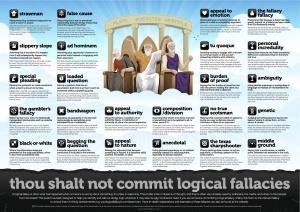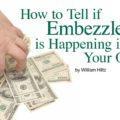#4 • Some common “I’m being embezzled” mistakes that dentists make.
THIS BLOG IS OUT-OF-DATE!
This blog was moved in 2019 and renamed "Dental FraudBusters"
#4 in our series of #TIPS intended to help you deal with fraud, embezzlement, waste, and abuse in your dental practice.
“I think I am being embezzled”
I have spoken with hundreds of dentists about fraud and embezzlement. Many were convinced or “pretty darn sure” that fraud was happening in their practice.
Indeed, probably half of those dentists had good reason to be concerned, because they were or had been embezzled.
The others were victims of logical fallacies. Errors in thinking and judgement which we can all easily fall victim to.
Dentists that make these errors can find themselves spending too much time and MONEY – on unnecessary investigation or begin behaving in ways that aggravate tension or depress “mood” in the practice. It’s hard to look an employee in the eye each day when you believe they are stealing.
Here are the most common “I’m being embezzled” mistakes that dentists make:
For more information about logical fallacies, click on the image or visit this website https://yourlogicalfallacyis.com
“False Cause”
Presuming a real or perceived relationship between two things, where one thing causes the other.
Example: “Every time I go to sleep, the sun goes down.”
Dentists make this logical fallacy when they convince themselves that embezzlement is occurring because of the presence of one or more “qualitative” red flags.
For example, let’s look at the red flag of “an employee working late hours.”
If someone asked you whether an employee has been working back late, and you answered “frequently” – do you mean once a month? Once a week? Every day? You answer is subjective.
Here’s another – “Does the employee appear to be living beyond their means?”
If you answer yes, does that mean your employee has more pairs of scrubs than you, or that they get a new car every two years? To answer this question accurately, you would need to know personal financial details about your employee, which is probably unavailable.
My point is, when answering qualitative questions, each dentist will respond differently, subject to the season, their memory, personal bias or whether they had their morning coffee.
False cause examples:
“Her lifestyle seems to be ‘too rich’, that’s a red flag. I’m being embezzled.”
“She won’t let me near the computer, that’s a red flag!”
And now the caveat… Dentists should not ignore the presence of qualitative red flags however; such red flags should be critically evaluated and if possible, supported by a quantitative (financial) red flag before assessing the real probability of embezzlement occurring.
Get answers from Dentistry’s Pioneer Embezzlement Consultant
“Whether you are curious, or have real concerns about fraud and embezzlement, I am here to help. I invite you to ask me your fraud and embezzlement questions.”
“I will respond to you privately, with insight, expert focus and direction – for FREE. This is a genuine offer, and your opportunity to obtain expert advice with no financial commitment.
And I will never recommend any course of action or unnecessary work just to line my own pockets. That’s a promise.”
Click here to ask your Question
William “Bill” Hiltz BSc MBA CET
“Black or White”
Two dentists, let’s call them Dr. Clinical and Dr. Business worked together and were business partners for almost 20 years. Dr. Clinical and Dr. Business worked the same hours and their production was almost identical.
As you may imagine, Dr. Business handled most of the practice’s finances for both dentists.
Over the years, Dr. Clinical observed that Dr. Business appeared to have a far better lifestyle. Dr. Clinical rationalized that since they both worked the same number of hours, and earned the same amount of revenue, that Dr. Business must have a “hand in the cookie jar”
The fact was, Dr. Business was a better financial planner and manager than Dr. Clinical, and over the years, this began to reveal itself.
“Bandwagon”
Dental example: “Two of my classmates were embezzled last year, so I’m pretty sure it’s happening to me”
“Appeal to Emotion”
This is when someone replaces a valid or compelling argument with an emotional response. When dentists are faced with the real or perceived belief that they are being embezzled, they often face fear, uncertainty and doubt. These negative emotions can support unfounded conclusions. Read my blog post about Fear, Uncertainty and Doubt.
“Genetic”
This is when you judge something either good or bad on the basis of where it came from, or from or originated.
“I just found out my office manager’s sister was charged with fraud, and you know – the apple doesn’t fall far from the tree.”




